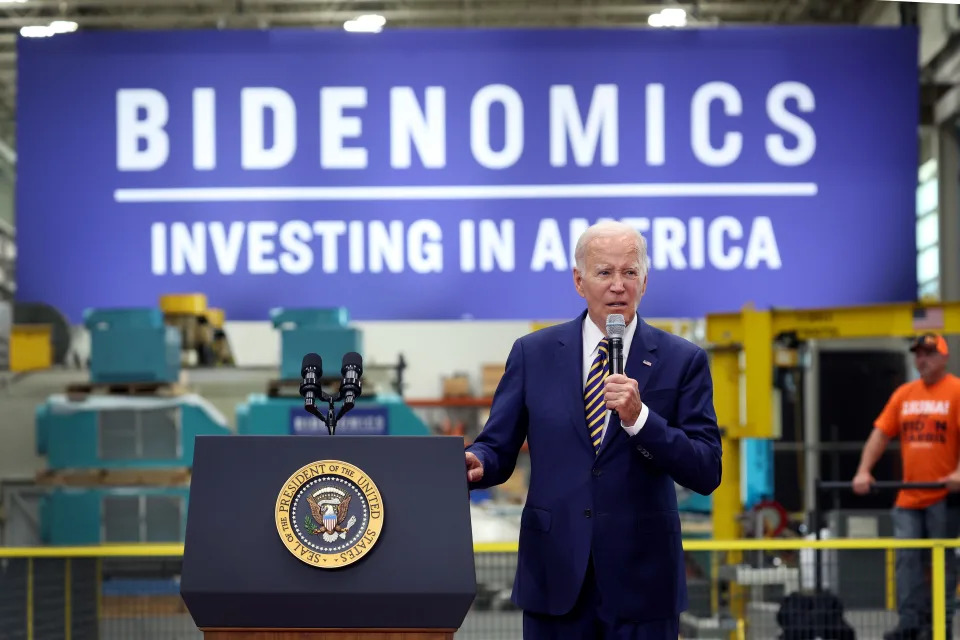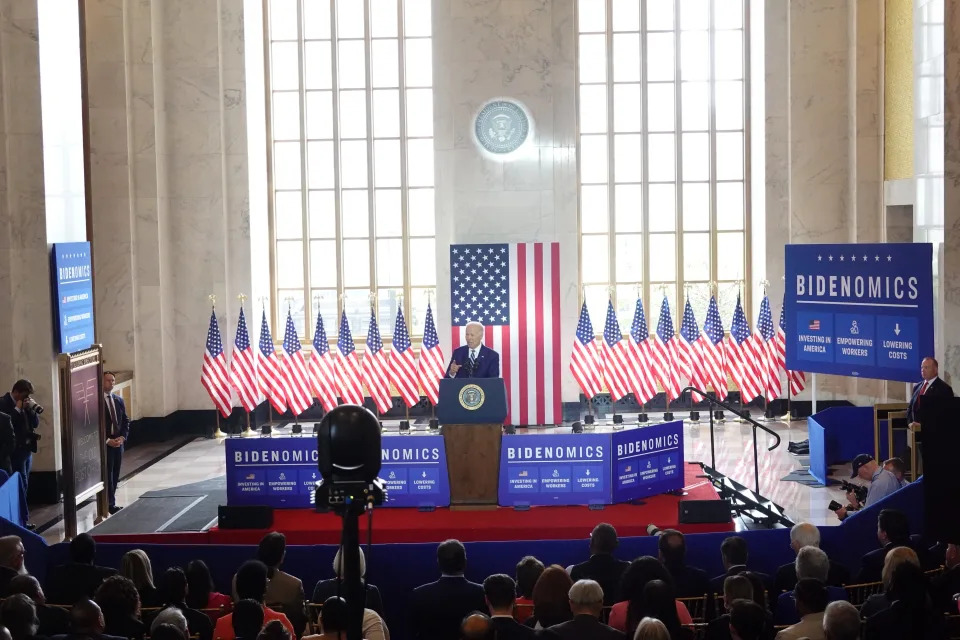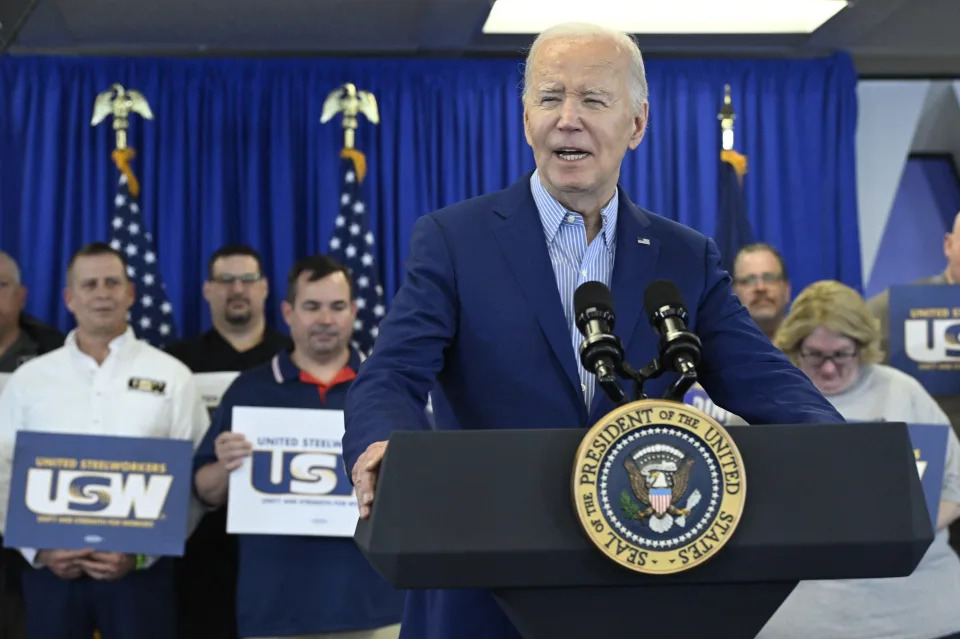WASHINGTON ― Last June, in what the White House envisioned would be a turning-point speech in Chicago, President Joe Biden introduced a new slogan aimed at selling an economic revival.
The mantra was "Bidenomics. And on this day, the word was plastered everywhere: flanking Biden on massive blue signs as he talked up an improving economy, across the base of his lectern, and draped down the walls of Chicago's historic post office where Biden spoke to a couple hundred supporters.
For the rest of the year, Biden would go on to tout "Bidenomics" about every time he discussed the economy as he sought to tie his policy agenda − investments in manufacturing, infrastructure and the middle class − to historically low unemployment, a robust jobs market, and inflation that, after peaking in the summer of 2022, was cooling.
But over time, all the "Bidenomics" talk has disappeared.
During a recent campaign swing this month in Pennsylvania − in which Biden made three stops and sought to contrast his economic agenda with former President Donald Trump's − Biden never mentioned the term "Bidenomics." Nor did he utter the phrase during separate addresses to electrical workers and builders unions over the past week. Or Thursday in Syracuse, N.Y., where he announced more than $6 billion in subsidies for two microchip factories.
More: How is Bidenomics playing in steel country? Angst about inflation is adding to skepticism.
President Joe Biden speaks to guests at Ingeteam Inc., an electrical equipment manufacturer, on August 15, 2023 in Milwaukee, Wisconsin. Biden used the opportunity to speak about his "Bidenomics" economic plan on the one-year anniversary of the Inflation Reduction Act of 2022.
The White House concluded that too many Americans didn't know what "Bidenomics" meant. Congressional Democratic candidates and party activists never embraced the label as they work to overcome the president's low approval ratings to win back control of the House.
And because inflation has proven stubbornly high, the slogan became synonymous with an economy that, despite several strong metrics, many Americans fear is headed in the wrong direction.
"'Bidenomics' could mean anything to people, and we needed words or phrases that communicate more −like jobs, (tackling) rising costs and 'junk fees,'" said Celinda Lake, a former Biden campaign pollster in the 2020 election. 'Bidenomics' ended up being confusing to voters because they thought it was Biden's economy rather than Biden's economic policies."
What 'Bidenomics' was supposed to mean versus what it became
"Bidenomics" was first coined by conservative critics of Biden in columns in the Financial Times and Wall Street Journal ahead of the 2020 election. By embracing the "Bidenomics" tag, the White House hoped to turn an attack line used by Republicans into a strength − similar to Democrats embracing "Obamacare," originally a Republican slander, as the name for President Barack Obama's signature health care law.
From the White House's perspective, "Bidenomics" was supposed to encompass an economic platform focused on growing an economy "from the middle out and the bottom up" − cutting health-care costs, forcing billionaires to "pay their fair share" in taxes, eliminating so-called "junk fees" and leveraging the federal government for historic investments in manufacturing of microchips and clean energy, infrastructure and innovation.
If Republicans were going to use "Bidenomics" as an attack, why not work to define it to Biden's advantage?
"I don’t think they meant it as a compliment, but they started referring to my economic policies as 'Bidenomics.' Well, guess what? It’s working," Biden said in a speech last August, reciting a line he turned to often.
But the calculus ignored a reality: When much of the country heard "Bidenomics," it reminded them of high inflation, not Biden's efforts to make the U.S. a microchip hotbed or the nation's economic rebound since the pandemic. Meanwhile, the outlook on the economy remains sour. In a New York Times/Sienna College poll this month, only 21% of voters described the economy as "excellent/good," compared to 79% who called it "fair/poor."
"I think that the fundamental root of it all was that people thought the situation would be parallel to Obamacare," Lake said. "And for a number of reasons, it wasn't remotely parallel to Obamacare."
Drew Weston, a professor of psychology and psychiatry at Emory University who consults for Democrats on messaging, questioned coining any policy or bill after a president's name, arguing it turns off nearly half the country automatically. And he said while the economic resurgence after the pandemic is "a phenomenal achievement," not all people have felt it.
"It was a bad call to use that term," Weston said. "At that time, people were seeing the Biden economy as the inflation economy. That appears to be changing, but I still wouldn't go back to 'Bidenomics.'"
President Joe Biden unveils his economic plan during an event in the lobby of the old post office building on June 28, 2023 in Chicago, Illinois. He is also scheduled to attend a fundraising event during the visit.
How Biden's use of 'Bidenomics' disappeared over time
Biden still leans into his message of "investing in America" and promotes the same policies. But nearly a month has passed since Biden said "Bidenomics" during public remarks. It came during a March 26 speech in Raleigh, North Carolina on his efforts to lower health care costs.
Before then, Biden hadn't used the word "Bidenomics" since late January, according to a USA TODAY review of Biden's public remarks archived by the White House. Most notably, Biden left "Bidenomics" out of his March 7 State of the Union address before Congress.
Vice President Kamala Harris, as well as White House press secretary Karine Jean-Pierre and other spokespeople for Biden, have also retired the phrase.
The messaging was very different last summer and fall.
Biden said "Bidenomics" 15 times in his June 28 speech in Chicago that debuted his new slogan to the nation. He mentioned "Bidenomics" another 77 times in speeches through October, including as many as six or seven times in single speeches.
"'Bidenomics'" is just another way of saying 'restoring the American Dream,'" Biden said last year on multiple occasions.
"That's Bidenomics in action," was another favorite Biden line that later disappeared.
In a Sept. 14 speech in Largo, Maryland, Biden framed the presidential election as a "choice between Bidenomics and MAGAnomics," accusing Trump and Republicans of wanting to cut taxes for the wealthiest Americans and corporations, gut Social Security and Medicare and end cost-saving measures for the middle class.
Yet Biden touted "Bidenomics" only four more times in both November and December, and he has said it only three times total this year.
President Joe Biden speaks during an event at the United Steelworkers Headquarters in Pittsburgh, Pennsylvania, on April 17, 2024. Biden is urging a tripling of tariffs on Chinese steel and aluminum, citing "unfair competition" while seeking to win blue-collar votes in November's election.
White House: 'The press is caught up in semantics'
From the outset, most Democratic House and Senate candidates were cool to embrace "Bidenomics" in their campaigns. Although they defend Biden's economic policies, no campaign ads emerged using the "Bidenomics" term. Rep. James Clyburn, D-S.C., a strong Biden ally, told NBC News in November that he didn't like the word.
"The people that he (Biden) stands for don’t deal with economics,” Clyburn said at the time. "They deal with day-to-day issues. They have to educate their children and feed their families and develop their communities − and that doesn’t sound like ‘Bidenomics.’”
An analysis by Axios found congressional Democrats went from saying "Bidenomics" nearly 500 times last July in public speeches and social media posts to just 10 times in March, compared to 474 mentions of "Bidenomics" by Republicans in March.
In a statement to USA TODAY, the White House downplayed Biden's shift away from "Bidenomics" as the focus of the media, not everyday Americans, and argued the president is still talking regularly about the policies that make up "Bidenomics."
“While the press is caught up in semantics, consumer confidence is higher than at this point under Presidents Obama, Bush, Clinton, and Reagan; the President’s economic approval is rising; and he is on the road touting his accomplishments that are widely supported and making a real difference in peoples’ lives," said Michael Kikukawa, assistant White House press secretary.
"The President will continue talking about Bidenomics − his agenda to grow the economy from the middle out and bottom up," he said, calling his approach a "sharp contrast" with Republicans.
Viet Shelton, spokesperson for the Democratic Congressional Campaign Committee, said House Democrats' and Biden's "victories for working families" is what will matter to voters in November − "not a slogan."
But if Democrats do look for another slogan, they might consider one Democrat's advice.
"If the the right suggests the term, don't use it," said Weston, author of "The Political Brain: The Role of Emotion in Deciding the Fate of the Nation."
"You never want to take the other side's branding of anything about you or your programs and run with it − because it's been designed by the other side to create the associations in people's minds that they want to create."
Reach Joey Garrison on X, formerly Twitter, @joeygarrison.
This article originally appeared on USA TODAY: President Biden scraps 'Bidenomics' after slogan falls flat

 German (DE)
German (DE)  English (US)
English (US)  Spanish (ES)
Spanish (ES)  French (FR)
French (FR)  Hindi (IN)
Hindi (IN)  Italian (IT)
Italian (IT)  Russian (RU)
Russian (RU) 

























Comments